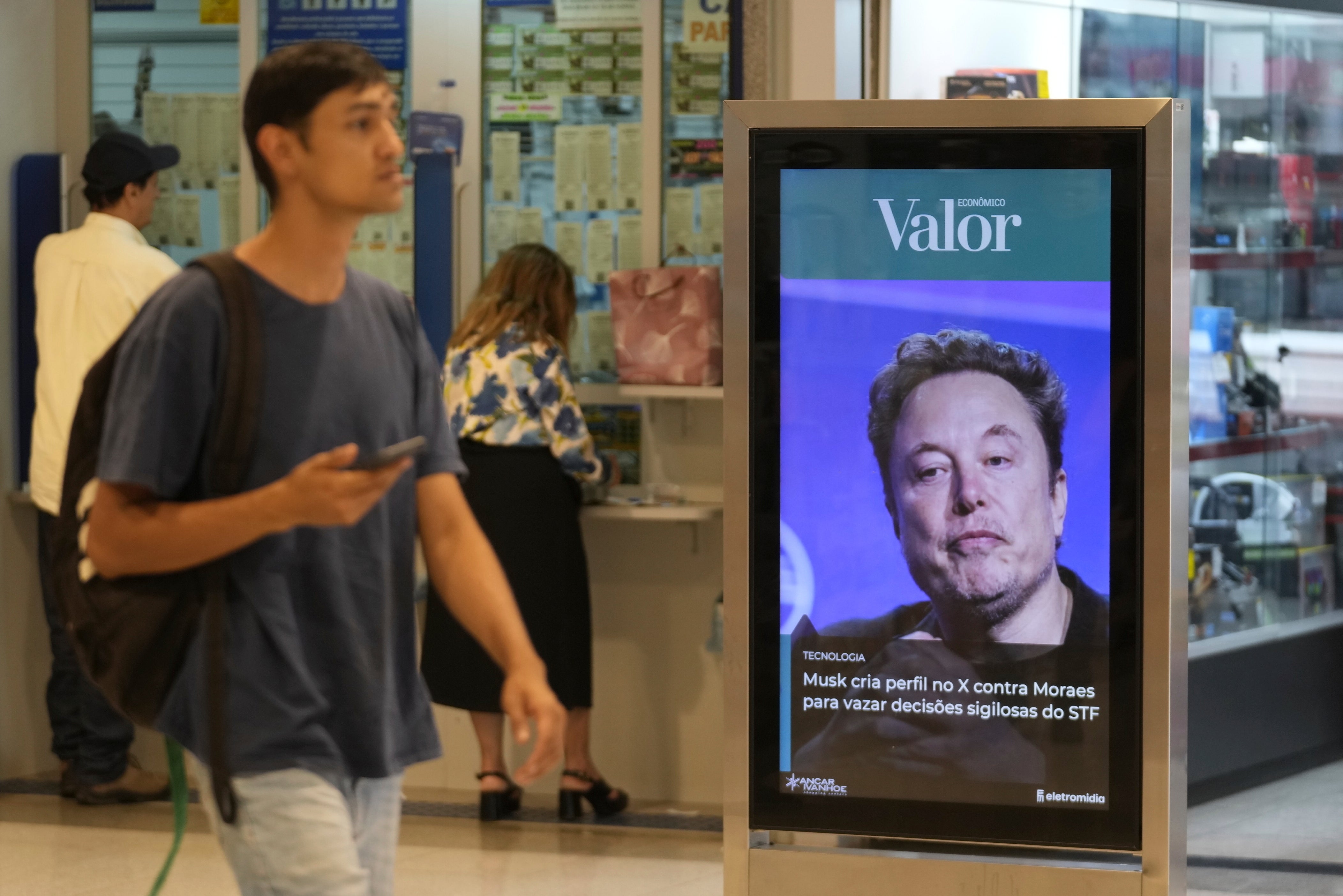Elon Musk's X is back in Brazil after its suspension, having complied with all judicial demands
The social media platform X is returning to Brazil after remaining inaccessible for more than a month following a clash between its owner, Elon Musk, and a justice on the country’s highest court

Your support helps us to tell the story
From reproductive rights to climate change to Big Tech, The Independent is on the ground when the story is developing. Whether it's investigating the financials of Elon Musk's pro-Trump PAC or producing our latest documentary, 'The A Word', which shines a light on the American women fighting for reproductive rights, we know how important it is to parse out the facts from the messaging.
At such a critical moment in US history, we need reporters on the ground. Your donation allows us to keep sending journalists to speak to both sides of the story.
The Independent is trusted by Americans across the entire political spectrum. And unlike many other quality news outlets, we choose not to lock Americans out of our reporting and analysis with paywalls. We believe quality journalism should be available to everyone, paid for by those who can afford it.
Your support makes all the difference.The social media platform X began returning to Brazil on Wednesday, after remaining inaccessible for more than a month following a clash between its owner, Elon Musk, and a justice on the country’s highest court.
Internet service providers began restoring access to the platform after Supreme Court Justice Alexandre de Moraes authorized lifting X’s suspension on Tuesday.
De Moraes ordered the shutdown of X on Aug. 30 after a monthslong dispute with Musk over free speech, far-right accounts and misinformation. Musk had disparaged de Moraes, calling him an authoritarian and a censor, although his rulings, including X’s nationwide suspension, were repeatedly upheld by his peers.
Musk’s company ultimately complied with all of de Moraes’ demands. They included blocking certain accounts from the platform, paying outstanding fines and naming a legal representative. Failure to do the latter had triggered the suspension.
Brazil — a highly online country of 213 million people — is one of X’s biggest markets, with estimates of its user base ranging from 20 million to 40 million.
The story continues
“X is proud to return to Brazil,” the company said in a statement posted on its Global Government Affairs account. “Giving tens of millions of Brazilians access to our indispensable platform was paramount throughout this entire process. We will continue to defend freedom of speech, within the boundaries of the law, everywhere we operate.”
The Aug. 30 ban came two days after the company said it was removing all its remaining staff in Brazil. X said de Moraes had threatened to arrest its legal representative in the country, Rachel de Oliveira Villa Nova Conceição, if the company did not comply with orders to block accounts.
Brazilian law requires foreign companies to have a local legal representative to receive notifications of court decisions and swiftly take any requisite action — particularly, in X’s case, the takedown of accounts.
Conceição was first named X’s legal representative in April and resigned four months later. The company named her to the same job on Sep. 20, according to the public filing with the Sao Paulo commercial registry.
Conceição works for BR4Business, a business services firm. Its two-page website provides no insight into its operations or staff. “Something great is on its way,” the top of the site’s main page reads in English. Its other page is an extensive privacy policy.
Neither Conceição nor BR4Business returned multiple phone calls and emails from the AP.
There is nothing illegal or suspect about using a company like BR4Business for legal representation, but it shows that X is doing the bare minimum to operate in the country, said Fabio de Sa e Silva, a lawyer and associate professor of International and Brazilian Studies at the University of Oklahoma.
“It doesn’t demonstrate an intention to truly engage with the country. Take Meta, for example, and Google. They have an office, a government relations department, precisely to interact with public authorities and discuss Brazil’s regulatory policies concerning their businesses,” Silva added.
Some of Brazilian X’s users have migrated to other platforms, such as Meta’s Threads and, primarily, Bluesky. It’s unclear how many of them will return to X. In a statement to the AP, Bluesky reported that it now has 10.6 million users and continues to see strong growth in Brazil. Bluesky has appointed a legal representative in the South American country.
Brazil was not the first country to ban X — far from it — but such a drastic step has generally been limited to authoritarian regimes. The platform and its former incarnation, Twitter, have been banned in Russia, China, Iran, Myanmar, North Korea, Venezuela and Turkmenistan. Other countries, such as Pakistan, Turkey and Egypt, have also temporarily suspended X before, usually to quell dissent and unrest.
X’s dustup with Brazil has some parallels to the company’s dealings with the Indian government three years ago, back when it was still called Twitter and before Musk purchased it for $44 billion. In 2021, India threatened to arrest employees of Twitter (as well as Meta’s Facebook and WhatsApp), for not complying with the government’s requests to take down posts related to farmers’ protests that rocked the country.
Musk’s decision to reverse course in Brazil after publicly criticizing de Moraes isn’t surprising, said Matteo Ceurvels, research firm Emarketer’s analyst for Latin America and Spain.
“The move was pragmatic, likely driven by the economic consequences of losing access to millions of users in its third-largest market worldwide, along with the millions of dollars in associated advertising revenue,” Ceurvels said. “Although X may not be a top priority for most advertisers in Brazil, the platform needs them more than they need it.”
___
Ortutay reported from San Francisco